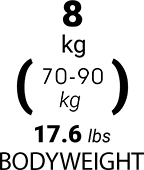
Although we attach a great deal of importance to health and well-being, excess stimuli usually remain in the sphere reserved for childhood ailments. As adults, we see the causes of our frustration, crises or deterioration of health mainly as a result of excessive tension and stress. Meanwhile, overstimulation plays an extremely important role here, and our daily habits should be taken into consideration.
When we look for the causes of insomnia, impaired concentration or apathy, we most often look for the reasons outside, e.g. problems at work, quarrels with a partner or an insecure financial situation. We forget, however, that the brain and kilometres of neurons process countless amounts of information from all areas of our lives, every minute of every hour of every day. The tensions that we experience do not usually result from the intensity of this process, but from all additional loads that we put on our body by activating too many senses at once.
A misunderstood rest
Although everyday stresses do have some impact on our psychophysical well-being, our condition is worsened by factors such as excess or deficiency of light, a noisy environment, thermal discomfort or irregular circadian rhythm. Often after a hard day spent outside our comfort zone, we return home in search of relief, relaxation and rest. However, we then sit in front of the TV, turn on the computer, call a friend, scroll through social media or go shopping. Most of these activities tire our eyesight, hearing, and even smell, giving our brain even more work and even more “files” for immediate processing. Is this the kind of leisure time our mind and body need to really rest and regenerate cells?
Circadian stressors
We have already developed an awareness of how overstimulation affects children’s development. When a toddler is exposed to constant flashing, lighting or playing, he becomes tired and irritable faster, and symptoms of stress also appear. Then we instinctively reduce the excess of stimuli for the child’s comfort – we turn down the music, turn off fairy tales, and draw the curtains. Meanwhile, the adult nervous system also needs rest and care, whilst also dealing with psychological stressors, you can also reduce stressors from the environment or those related to the circadian rhythm. Their excess or inadequate quality negatively affects the mental state, acts as a mood dampener, hampers the regulation of emotions and stress reduction, and also reduces the effectiveness of our immune system.
Know your own limits
If you want to improve the quality of your rest and reduce exposure to stimuli, it is useful to get acquainted with your own limits, e.g. lights or sounds that make you feel comfortable. Note how your body reacts to a stimulus, depending on various individual characteristics. That’s why it’s so important to get to know yourself and the environmental conditions that promote well-being. It is also worth observing at what intensity of stimuli the tensions you experience still have a mobilizing function, and at what point you need to deal with its negative effects. Unfortunately, in the case of awakening, we often fall into a kind of “vicious cycle”: we experience mental stress, so we drown it out with stimuli, and the excess of stimuli generates further stress that requires jamming. Many simple and effective changes can be introduced almost immediately, but the first step will always be a conscious decision to break the stimulus loop based on the conclusions we draw about our individual comfort limits.




